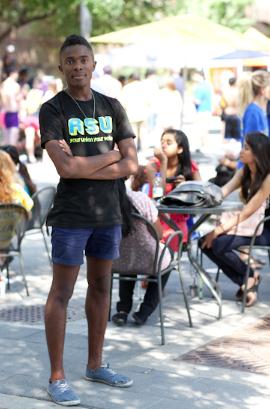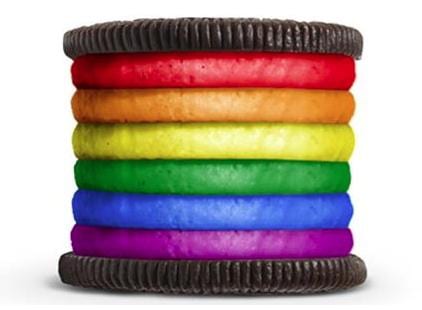
Ryerson Student Union President Rodney Diverlus says corporate Pride advertisements should be backed up with corporate support. Credit: Adam Coish
What’s bright and colourful in six layers of frosting? A Facebook photo produced by Oreo as part of the cookie’s 100th birthday celebrations.
The image of the eye-catching biscuit was created to coincide with Pride Week in June and it held all the colours of the rainbow between two chocolate wafers.
The photo – captioned “Proudly support love!” – was soon the talk of the internet. Some loved it, others screamed boycott. One commenter wrote, “Being gay is an abmonitation in GOd’s eyes i wont be buying them anymore [sic].”
However, there were also those who called for Oreo to manufacture and sell the cookie. Creators of one change.org petition lobbied to “Make the GAY OREO a REAL Oreo!”
“This could make a huge impact on the fight for civil rights. You can’t pretend not to notice it when it’s on the shelf at your grocery store,” one person wrote on the petition website. Another noted, “Because this cookie looks absolutely delicious, and the cause is beyond good! And on a completely taste-related basis, the cream-to-cookie ratio is perfect.”
Comments like these raise the question: do pro-gay marketing campaigns exist to help a movement or do they exist because companies want quick and easy access to a new market?
Consider the Oreo photo. It was released just after American President Barack Obama voiced his support for marriage equality. It was also timed with Pride season, when many are suckers for anything in rainbow colours. And while some did threaten to boycott the cookie, there is little danger of a sales drop.
Bob Witeck is president and co-founder of Witeck Communications, a corporate consulting agency specializing in gay and lesbian consumer markets. He says consumer boycotts seldom have a real effect on sales, especially with a product like Oreo. “Kids love Oreos; they’re not going to stop buying them,” Witeck says. And in general, “the notion of a backlash or boycott just isn’t relevant anymore. People become uncomfortable, yes, agitated or angry, but . . . the average family is busy enough, and occupied with other things, so when they see someone has this gay Oreo cookie, they don’t drop everything and boycott.”
He says Oreo’s makers are trying to broaden its consumer base. Oreo, and Kraft, its parent company, are seen as the brand your mother buys – not necessarily what the young hipster reaches for, especially since you don’t find Oreos in the organic aisle.
“One of the things a gay audience does for both brands is it’s base-broadening, gender-broadening,” Witeck says. “They think they have got to connect with younger audiences and be relevant.”
The makers of Oreo made this connection by simply producing a photo, which is easier than creating an actual product. And based on this one image, they were able to attract a wealth of attention. But a throwaway photo doesn’t necessarily promote gay rights.
Meanwhile, some Canadian companies, like the Royal Bank of Canada, have actively promoted gay rights through corporate sponsorships, such as Toronto’s Pride parade, for years. RBC went even further when it refused to allow a Quebec-based “pro-family” organization to open an account when the group criticized the 2006 Montreal Gay Games.
British Columbia-based Telus has launched several concept stores called Come As You Are, or Caya stores, which are specifically oriented to the gay, bisexual, transgender and questioning community. The first store was launched in Vancouver in 2010 and features 20-foot ceilings, designer lighting and exclusive accessories.
For many activists, such tangible examples of corporate commitment to gay rights is the only acceptable support.
Rodney Diverlus, president of the Ryerson Students’ Union and past vice-president of the union’s equity department, says corporations should run campaigns that go beyond the surface value of an ad.
“Producing the ad without acknowledging that there is still work that needs to be done and that we are all complicit in reproducing homophobia and transphobia can be more harmful than helpful,” he says, noting he’d like to see corporations connecting to grassroots community campaigns.
“The power of community trumps all, but we live in a system where making changes requires lots of funding and support. If we were able to get the full, true, genuine support of organizations that have a mass media following, some of these fights that take many years would be much easier.”
Sarah Lowes, a student at the University of Toronto, says she likes the idea of a large corporation supporting diversity and inclusion. “That being said, if they were really in support of such things, maybe they should donate some of their advertising money to non-profits with the same vision – that might be a better use of their resources.”
Meanwhile, Steven Smith, a Toronto-based dancer, says he likes pro-gay products, but “I don’t go out of my way to buy rainbow chip cookies every time I get cookies. There’s only so much good buying a ‘gay-themed’ product can do. If there were also some kind of fund that Oreo would donate to every time they sold the rainbow cookies, then I’d be more inclined to buy them, because then there would be a reason beyond simple consumerism.”
Of course, the glut of gay-themed products can get overwhelming during Pride month. Witeck says companies need to remember that gay people spend money during the other 11 months of the year. “It boggles me sometimes that it’s only in June that we see gay people. In fact, there’s so much going on sometimes in June, I wonder why companies want to be a part of that? There’s also a little backlash from gay people who think they’re cashing in on it.”
Diverlus also questions the timing of such ads. “A rainbow Oreo cookie that exists for one week screams of pinkwashing. This has to be something that exists beyond Pride Week, when a lot of people are spending money.”
In the case of Oreo, Kraft is a former sponsor of the Gay Games.
Witeck says it’s important to research companies you want to support. He suggests consulting the Human Rights Campaign’s Corporate Equality Index, which lists companies with the highest workplace equality ratings with respect to lesbian, gay, bisexual and trans people. Because it’s important to ensure there is something going on beyond a rainbow sticker – even when the sticker is made of frosting.

 Why you can trust Xtra
Why you can trust Xtra


